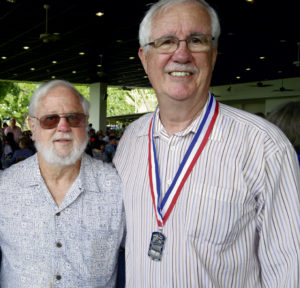
It was dark at Pearl Harbor’s Tripler Hospital on the evening of Dec. 7, 1941. The bombings by the Japanese had stopped, but the concern of more attacks continued. Window blinds were still drawn and lights were still out. The injured and dying lay everywhere, and as many people as possible were taking care of them.
It was an extraordinary time — especially for one young mother, who gave birth in that chaos.
“There was a baby born in the evening, in the dark. They had a flashlight. That’s what [the nurse] used to illuminate for the doctor,” said Winnie Woll, the daughter of Army Pearl Harbor nurse Teresa Stauffer Foster. “This baby came into life when all these other people around were dying.”
When Woll told me that story, I was a little bit shocked and even more curious to find out who that baby was. I eventually learned his name was David Burpee. It turns out he was one of two infants born that day, and the military pretty much became the theme for his whole life.
When I said I would be interviewing Burpee, a lot of colleagues jokingly asked if I was going to see what he “remembered” from that day. Clearly, the answer is nothing, but he definitely knew the details from the story his parents told him.
Mom and Dad
Burpee’s father, Harry, had enlisted into the Army Signal Corps and was stationed at Schofield Barracks in Hawaii before being sent to Wake Island to help install bomber beacons.
“On the way out, his sergeant talked to the commander and said, ‘Don’t forget, Sgt. Burpee is going to have a baby. You’re going to send him back, right?’” Burpee recounted. Apparently, it took a while for that promise to be kept, but eventually his dad was shipped back.
“He was halfway in between Wake and Hawaii when the attack occurred. His unit was all shot up in Hawaii, and everybody on Wake was killed or captured and died in a prison camp,” Burpee said, referring to the Japanese attack on Wake Island around the same time as the Pearl Harbor attack.
As for Burpee’s mother, Amney? She’d been in Tripler for three days already, expecting his arrival.
“Three times during the day I was born, they had to move her, from one maternity ward to a makeshift maternity ward to just a regular ward, because they were bringing in the wounded so fast,” Burpee said.
Much like many Americans intimately involved in World War II, Burpee’s mom didn’t talk about her Pearl Harbor experience much.
“It was strange — she was like a soldier who had really been on the front lines,” Burpee said. “They’re the ones who don’t talk about it much, and she didn’t either.”
Not alone
Perhaps the most fun things Burpee learned about his birth? That he had a nickname from Day 1 — and he wasn’t the only baby.
“There was one other child, a male, born in Tripler that day,” he said. “There were privacy concerns as well as wartime concerns, so rather than release names, they gave the babies nicknames. He was born during the attack, so his nickname was ‘Blitz,’ and I was born after the attack, when things quieted down later at night, so my nickname was ‘Blackout.’”
Three weeks after the attack, because there were concerns of a land invasion, officials moved all female civilians and children onto a troop transport to take them to California. So, Blackout’s stint on Hawaii didn’t last long, but it’s something that he eventually realized was pretty special.
“I think the first time of significance was when I was in high school, and a local newspaper found out that I was a Dec. 7, 1941, baby. They came out and did an interview, and I thought, ‘OK, that’s kind of interesting,’” he said.
A military life
Burpee went on to become a lifelong Army man himself, rising to the rank of colonel during a 28-year career that included a combat tour in Vietnam. Burpee served in several public affairs positions, too, including as the media officer when U.S. Central Command formed. Burpee was the personal public affairs advisor to NATO’s supreme allied commander for Europe during the Gulf War. He also worked at the Pentagon’s press room and for the Office of Secretary of Defense before he retired in 1993.
“I loved every minute of it. One job was better than the next,” Burpee said. “For me, it’s been the interaction with the people, … being exposed to the Army, Navy, Air Force, Marines and Coast Guard, because most of my time has been spent in joint or unified or international commands. It’s really very gratifying to see.”
As for that other baby, Blitz? Burpee said his name is Stan Loer, he lives in Oregon, and they met for the first time when they both returned to Pearl Harbor for the 75th anniversary of the attacks in 2016.
Burpee’s parents had passed before that 75th commemoration, but he and several other relatives returned to the scene of his birth to attend the remembrance ceremonies at Hickam Field, where his parents had lived. While he won’t be attending the 80th commemoration this year, he said he wishes he could continue honoring the men and women who lived, died and fought that day.
This story has been updated from its original publication on DODLive.mil in 2016.


